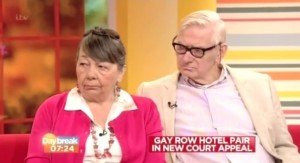 LONDON — The five justices of the British Supreme Court have ruled against the Christian owners of a UK bed and breakfast for declining to allow two men to sleep together because they are homosexual.
LONDON — The five justices of the British Supreme Court have ruled against the Christian owners of a UK bed and breakfast for declining to allow two men to sleep together because they are homosexual.
As previously reported, Peter and Hazelmary Bull have placed the Chymorvah Hotel on the market as they state that circumstances have devastated their business and lives.
“In 2013, two people who worked all their lives at this have ended up cold and hungry. It’s not right,” Hazelmary told the Daily Mail. “This is like a death in the family. I never thought it would end like this. We are not facing the future with any real enthusiasm.”
The situation occurred in 2008, when Martyn Hall and Steven Preddy reserved a double room, but was turned away by the manager when he discovered they were homosexuals. Chymorvah Hotel does not allow unmarried couples–homosexual or heterosexual–to share a room.
“Please note that as Christians we have a deep regard for marriage (being the union of one man to one woman for life to the exclusion of all others),” the business website states. “Therefore, although we extend to all a warm welcome to our home, our double bedded accommodation is not available to unmarried couples.”
However, after Hall and Preddy were turned away, the Bulls found themselves having to face a legal battle in court. They were ordered by the Bristol County Court to pay restitution to the men in the amount of $2,900 each, and also racked up a considerable bill in legal fees.
After losing in appeals court, they appealed the case to the Supreme Court in hopes of having the ruling overturned and the order to pay damages annulled. However, on Wednesday, the court sided with Hall and Preddy, stating that because the men were in a civil partnership, they should have had the same–or similar–protections as if they were married.
“Marriage and civil partnership exist both to recognise and to encourage stable, committed, long-term relationships. It is very much in the public interest that intimate relationships be conducted in this way,” the justices stated. “Now that, at long last, same-sex couples can enter into a mutual commitment which is the equivalent of marriage, the suppliers of goods, facilities and services should treat them in the same way.”
The court also noted that the case served as “a measure of how far we have come in the recognition of same-sex relationships.”
However, the Bulls expressed disappointment over the ruling, stating that they found it ironic that while homosexuals are protected by the courts, Christians are discriminated against and treated as second-class citizens.
“Obviously, we are deeply disappointed and saddened by the outcome. We’re just ordinary Christians who believe in the importance of marriage as the union of one man and one woman,” they stated. “Britain ought to be a country of freedom and tolerance, but it seems religious beliefs must play second fiddle to the new orthodoxy of political correctness.”
“Somehow, we have got to find a way of allowing different beliefs to coexist in our society,” the Bulls said. “The judges sidestepped that big issue and reinforced the notion that gay rights must trump everything else.”
Similar rulings are occurring in the United States as a number of florists, bakers, hotel owners and photographers have been declared guilty of discrimination for operating their business in accordance with their Christian values.
Become a Christian News Network Supporter...


